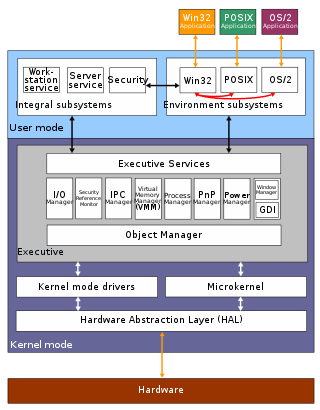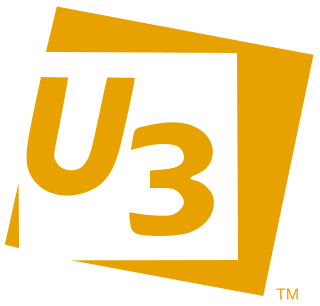
Microsoft DirectX is a collection of application programming interfaces (APIs) for handling tasks related to multimedia, especially game programming and video, on Microsoft platforms. Originally, the names of these APIs all began with "Direct", such as Direct3D, DirectDraw, DirectMusic, DirectPlay, DirectSound, and so forth. The name DirectX was coined as a shorthand term for all of these APIs and soon became the name of the collection. When Microsoft later set out to develop a gaming console, the X was used as the basis of the name Xbox to indicate that the console was based on DirectX technology. The X initial has been carried forward in the naming of APIs designed for the Xbox such as XInput and the Cross-platform Audio Creation Tool (XACT), while the DirectX pattern has been continued for Windows APIs such as Direct2D and DirectWrite.
Microsoft Windows was announced by Bill Gates on 10 November 1983, 2 years before it was first released. Microsoft introduced Windows as a graphical user interface for MS-DOS, which had been introduced two years earlier. The product line evolved in the 1990s from an operating environment into a fully complete, modern operating system over two lines of development, each with their own separate codebase.
Microsoft Windows is a product line of proprietary graphical operating systems developed and marketed by Microsoft. It is grouped into families and sub-families that cater to particular sectors of the computing industry – Windows (unqualified) for a consumer or corporate workstation, Windows Server for a server and Windows IoT for an embedded system. Defunct families include Windows 9x, Windows Mobile, Windows Phone, and Windows Embedded Compact.

Windows 98 is a consumer-oriented operating system developed by Microsoft as part of its Windows 9x family of Microsoft Windows operating systems. It is the second operating system in the 9x line, as the successor to Windows 95. It was released to manufacturing on May 15, 1998, and generally to retail on June 25, 1998. Like its predecessor, it is a hybrid 16-bit and 32-bit monolithic product with the boot stage based on MS-DOS.

The Graphics Device Interface (GDI) is a legacy component of Microsoft Windows responsible for representing graphical objects and transmitting them to output devices such as monitors and printers. It was superseded by DirectDraw API and later Direct2D API. Windows apps use Windows API to interact with GDI, for such tasks as drawing lines and curves, rendering fonts, and handling palettes. The Windows USER subsystem uses GDI to render such UI elements as window frames and menus. Other systems have components that are similar to GDI; for example: Mac OS has QuickDraw, and Linux and Unix have X Window System core protocol.
Virtual PC is an x86 emulator for PowerPC Mac hosts and a virtualization app for Microsoft Windows hosts. It was created by Connectix in 1997 and acquired by Microsoft in 2003. The Mac version was discontinued in 2006 following the Mac transition to Intel, while the Windows version was discontinued in 2011 in favour of Hyper-V.
Windows Management Instrumentation (WMI) consists of a set of extensions to the Windows Driver Model that provides an operating system interface through which instrumented components provide information and notification. WMI is Microsoft's implementation of the Web-Based Enterprise Management (WBEM) and Common Information Model (CIM) standards from the Distributed Management Task Force (DMTF).
The Encrypting File System (EFS) on Microsoft Windows is a feature introduced in version 3.0 of NTFS that provides filesystem-level encryption. The technology enables files to be transparently encrypted to protect confidential data from attackers with physical access to the computer.
DirectSound is a deprecated software component of the Microsoft DirectX library for the Windows operating system, superseded by XAudio2. It provides a low-latency interface to sound card drivers written for Windows 95 through Windows XP and can handle the mixing and recording of multiple audio streams. DirectSound was originally written for Microsoft by John Miles.

Windows Console is the infrastructure for console applications in Microsoft Windows. An instance of a Windows Console has a screen buffer and an input buffer. It allows console apps to run inside a window or in hardware text mode. The user can switch between the two using the Alt+↵ Enter key combination. The text mode is unavailable in Windows Vista and later. Starting with Windows 10, however, a native full-screen mode is available.

U3 was a joint venture between SanDisk and M-Systems, producing a proprietary method of launching Windows software from special USB flash drives. Flash drives adhering to the U3 specification are termed "U3 smart drives". U3 smart drives come preinstalled with the U3 Launchpad. Applications that comply with U3 specifications are allowed to write files or registry information to the host computer, but they must remove this information when the flash drive is ejected. Customizations and settings are instead stored with the application on the flash drive.
In Microsoft Windows, a Cryptographic Service Provider (CSP) is a software library that implements the Microsoft CryptoAPI (CAPI). CSPs implement encoding and decoding functions, which computer application programs may use, for example, to implement strong user authentication or for secure email.
The Speech Application Programming Interface or SAPI is an API developed by Microsoft to allow the use of speech recognition and speech synthesis within Windows applications. To date, a number of versions of the API have been released, which have shipped either as part of a Speech SDK or as part of the Windows OS itself. Applications that use SAPI include Microsoft Office, Microsoft Agent and Microsoft Speech Server.
A Bluetooth stack is software that is an implementation of the Bluetooth protocol stack.
Microsoft PowerToys is a set of freeware system utilities designed for power users developed by Microsoft for use on the Windows operating system. These programs add or change features to maximize productivity or add more customization. PowerToys are available for Windows 95, Windows XP, Windows 10 and Windows 11. The PowerToys for Windows 10 and Windows 11 are free and open-source software licensed under the MIT License and hosted on GitHub.

In computing, the trash, also known by other names such as dustbin, wastebasket, and others, is a graphical user interface desktop metaphor for temporary storage for files set aside by the user for deletion, but not yet permanently erased. The concept and name is part of Mac operating systems, a similar implementation is called the Recycle Bin in Microsoft Windows, and other operating systems use other names.

FreeCell, also known as Microsoft FreeCell, is a computer game included in Microsoft Windows, based on a card game with the same name.
Windows XP, which is the next version of Windows NT after Windows 2000 and the successor to the consumer-oriented Windows Me, has been released in several editions since its original release in 2001.

Microsoft Tablet PC is a term coined by Microsoft for tablet computers conforming to a set of specifications announced in 2001 by Microsoft, for a pen-enabled personal computer, conforming to hardware specifications devised by Microsoft and running a licensed copy of Windows XP Tablet PC Edition operating system or a derivative thereof.
OpenSC is a set of software tools and libraries to work with smart cards, with the focus on smart cards with cryptographic capabilities. OpenSC facilitate the use of smart cards in security applications such as authentication, encryption and digital signatures. OpenSC implements the PKCS #15 standard and the PKCS #11 API. For its reader backend OpenSC can use either CT-API or PC/SC.